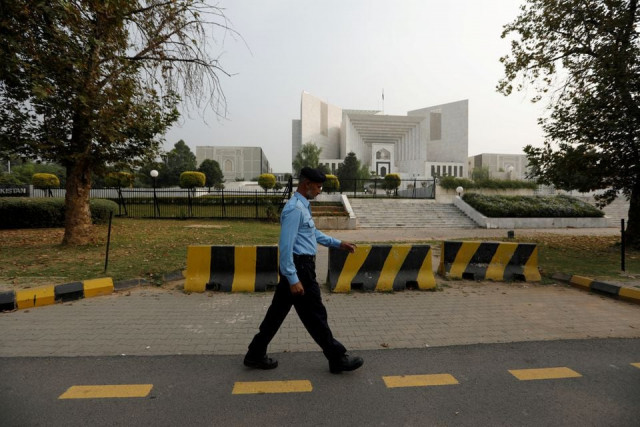False accusation of adultery goes unpunished, regrets SC
Justice Isa says offence of Qazf falls short of granting women protection from slander as it became 'dead letter law'

The Supreme Court has observed that the Offence of Qazf (Enforcement of Hudood) Ordinance 1979 – false accusation of fornication or adultery – was aimed at granting women the Quranic protection against such slander but regretted that it had fallen short of effectuating its intentions as it had been rendered into a “dead letter law”.
"Instead, what is seen is that women are first slandered and then murdered, and more often than not on mere suspicion, and she is buried having lost both her life and reputation in this world,” observed Justice Qazi Faez Isa in a judgement he authored while hearing a post-arrest bail.
He regretted that oftentimes the victim’s husband or someone from her own family is the perpetrator, and sometimes both sides join hands in committing the murder while the truth is suppressed by all.
A division bench of the apex court headed by Justice Isa took up the case wherein a 37-year-old woman was murdered on the pretext of honour.
Regional Police Officer (RPO) Mardan Yaseen Farooq appeared before the bench and told the court the crime was further investigated when it came to his notice, adding that, if required, a supplementary challan may be submitted.
However, to the surprise of the bench members, the RPO made revelations that while there were over 50 lady constables in his division, there was not a single lady police officer to investigate crimes.
The bench said the complete absence of lady police officers was "very surprising" given that the populous Mardan division comprised five districts including Swabi, Nowshera, Mardan, Charsadda and Mohmand
Read ‘Pendency in cases biggest challenge to criminal system’
The bench noted that a lady police officer should be associated with these types of cases, particularly where the complainant or the witnesses are ladies, “who may not be forthcoming before male police officers, are intimidated or actively conceal the truth of the matter”.
"In such cases, usual methods in investigating crimes may also not reveal the truth. And, the emphasis placed on the complainant’s statement needs careful and proper consideration.
"Circumstantial evidence and the stated motive be tested for veracity, and it is explored whether behind the crime there was another motive," the judgement read.
The court also noted that to better investigate rape cases, the province of Punjab had formulated “Standard Operating Procedure (SOP) for Investigation of Rape Cases”, suggesting that a similar practice in Khyber-Pakhtunkhwa could improve prosecutions and investigations with regard to crimes against women.
Justice Isa also said that when women are killed on account of an allegation or suspicion of impropriety on their part it is a matter of grave concern.
The top court asked the concerned authorities to reflect upon ways in which such cases could be investigated in a better way, ordering to make requisite rules and regulations or issue requisite instructions in this regard.
This may also have a salutary effect to ensure that women’s names and character are not unnecessarily slandered and besmirched, the judgement said.
The bench ordered that a copy of this order together with a copy of its judgement in the case of Babar Vs. the State be sent to the advocate general K-P, the provincial police officer and to the home secretary for information and compliance.
The provincial police officer should also distribute it to all regional police officers in the province, the order said.

1725254039-0/Untitled-design-(24)1725254039-0-208x130.webp)

















COMMENTS
Comments are moderated and generally will be posted if they are on-topic and not abusive.
For more information, please see our Comments FAQ